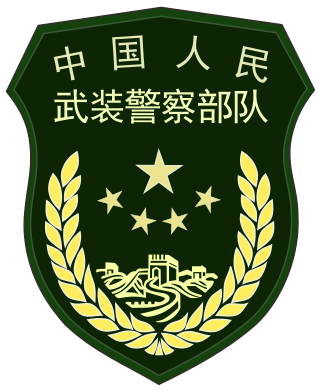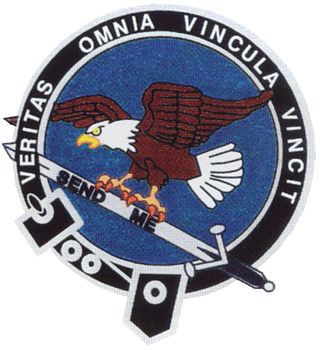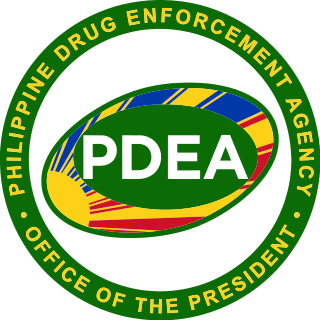
The Chinese People's Armed Police Force is a Chinese paramilitary organization primarily responsible for internal security, riot control, counter-terrorism, disaster response, law enforcement and maritime rights protection as well as providing support to the People's Liberation Army Ground Force (PLAGF) during wartime.

Law enforcement in India is imperative to keep justice and order in the nation. Indian law is enforced by a number of agencies. Unlike many federal nations, the constitution of India delegates the maintenance of law and order primarily to the states and territories.

The United States Naval Criminal Investigative Service (NCIS) is the primary investigative law enforcement agency of the U.S. Department of the Navy. Its primary function is to investigate major criminal activities involving the Navy and Marine Corps, though its broad mandate includes national security, counterintelligence, counterterrorism, cyberwarfare, and the protection of U.S. naval assets worldwide. NCIS is the successor organization to the former Naval Investigative Service (NIS), which was established by the Office of Naval Intelligence after the Second World War.

The Kosovo Police is the national policing law enforcement agency of Kosovo. It was established in 1999 and took its current form with the 2008 police law. It consists of five departments and eight regional directorates and is represented at the political level by the Ministry of Internal Affairs and Public Administration of the Republic of Kosovo.

The Canadian Forces Military Police provide police, security and operational support services to the Canadian Armed Forces (CAF) and the Department of National Defence (DND) worldwide.
The Specialist Operations directorate is a unit of the Metropolitan Police of London, UK responsible for providing specialist policing capabilities including national security and counter-terrorism operations. The Specialist Operations Directorate is currently led by Assistant Commissioner Matt Jukes.
The Australian Intelligence Community (AIC) and the National Intelligence Community (NIC) or National Security Community of the Australian Government are the collectives of statutory intelligence agencies, policy departments, and other government agencies concerned with protecting and advancing the national security and national interests of the Commonwealth of Australia. The intelligence and security agencies of the Australian Government have evolved since the Second World War and the Cold War and saw transformation and expansion during the Global War on Terrorism with military deployments in Afghanistan, Iraq and against ISIS in Syria. Key international and national security issues for the Australian Intelligence Community include terrorism and violent extremism, cybersecurity, transnational crime, the rise of China, and Pacific regional security.

The Bureau of International Narcotics and Law Enforcement Affairs (INL) is an agency that reports to the Under Secretary for Civilian Security, Democracy, and Human Rights within the Department of State. Under the umbrella of its general mission of developing policies and programs to combat international narcotics and crime, INL plays an important role in the training of partner nation security forces.

The Bulgarian Gendarmerie is part of the Bulgarian Ministry of Interior or "MoI"/"MVR".. It forms part of the country's General Directorate "Gendarmerie, Special Operations and Counterterrorism".

The United States Army Intelligence Support Activity (USAISA), frequently shortened to Intelligence Support Activity (ISA), also known at various times as Joint Reconnaissance Evaluation Group (JREG), Mission Support Activity (MSA), Office of Military Support (OMS), Field Operations Group (FOG), Studies and Analysis Activity (SAA), Tactical Concept Activity, Tactical Support Team, and Tactical Coordination Detachment, and also nicknamed "The Activity" and the Army of Northern Virginia, is a United States Army Special Operations unit which serves as the intelligence gathering component of Joint Special Operations Command (JSOC). Within JSOC, the unit is often referred to as Task Force Orange. Originally subordinated to the US Army Intelligence and Security Command (INSCOM), it is one of the least known intelligence components of the United States military, tasked with clandestine HUMINT operations and collecting actionable intelligence during or prior to JSOC missions.

The Anti-Narcotics Force is a federal executive bureau and a paramilitary force of the Government of Pakistan, tasked with combating the narcotics smuggling and use within Pakistan. ANF works under the umbrella of Pakistan Army and Ministry of Narcotics Control (Pakistan) of which Shahzain Bugti is the minister since March 2022. Due to misconception on Section 4 of ANF ACT 1997, the force's head consisted of the active-duty general officer of Pakistan Army. Although the law prescribes that any competent person may be appointed as Director-General. Currently, a two-star Army Officer, Major general Muhammad Aniq Ur Rehman Malik is deputed as Director-General. The ANF also has sole responsibility for coordinating and pursuing Pakistan narcotics investigations abroad.

The Ministry of Interior Affairs is the cabinet ministry of Afghanistan responsible for law enforcement, civil order and fighting crime. The ministry's headquarters is located in Kabul.
The counter-terrorism page primarily deals with special police or military organizations that carry out arrest or direct combat with terrorists. This page deals with the other aspects of counter-terrorism:

The Philippine Drug Enforcement Agency is the lead anti-drug law enforcement agency, responsible for preventing, investigating and combating any dangerous drugs, controlled precursors and essential chemicals within the Philippines. The agency is tasked with the enforcement of the penal and regulatory provisions of Republic Act No. 9165, otherwise known as the Comprehensive Dangerous Drugs Act of 2002.

Mohammed Daud Daud, also known as General Daud Daud, an ethnic Tajik, was the police chief in northern Afghanistan and the commander of the 303 Pamir Corps. He was an opponent of the Afghan Taliban.
The Afghan National Security Forces (ANSF), also known as the Afghan National Defense and Security Forces (ANDSF), were the military and internal security forces of the Islamic Republic of Afghanistan.

The Special Inspector General for Afghanistan Reconstruction (SIGAR) is the U.S. government's leading oversight authority on Afghanistan reconstruction. Congress created the Office of the Special Inspector General for Afghanistan Reconstruction to provide independent and objective oversight of the Afghanistan Reconstruction funds. Under the authority of Section 1229 of the National Defense Authorization Act for Fiscal Year 2008, SIGAR conducts audit, inspections, and investigations to promote efficiency and effectiveness of reconstruction programs, and to detect and prevent waste, fraud, and abuse of taxpayer dollars. SIGAR also has a hotline that allows individuals to report suspected fraud.
Lieutenant General Sayed Abdul Ghafar Sayed zadah, is an Afghan Lieutenant general. He served for more than 30 years in policing in Afghanistan; currently he is serving as General Chief of Herat police headquarters.













